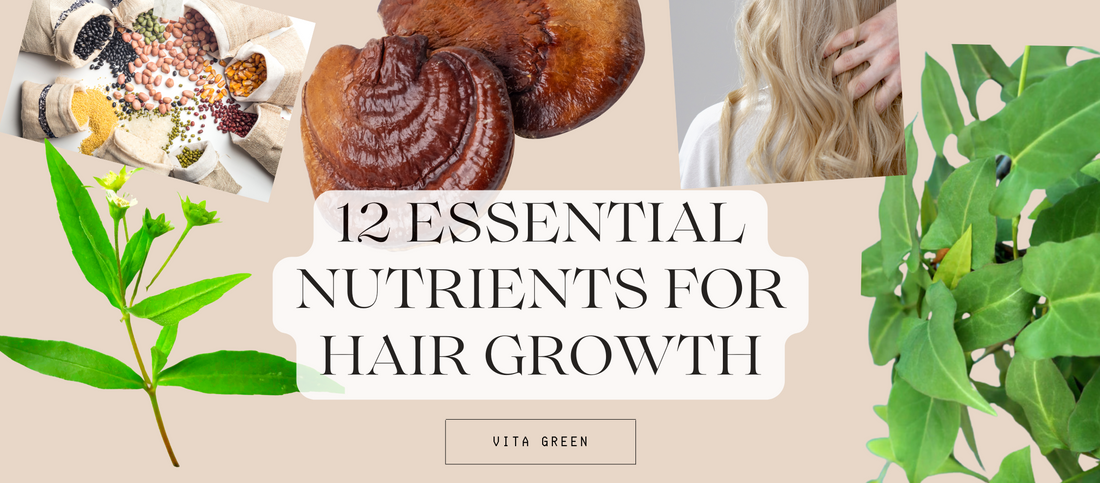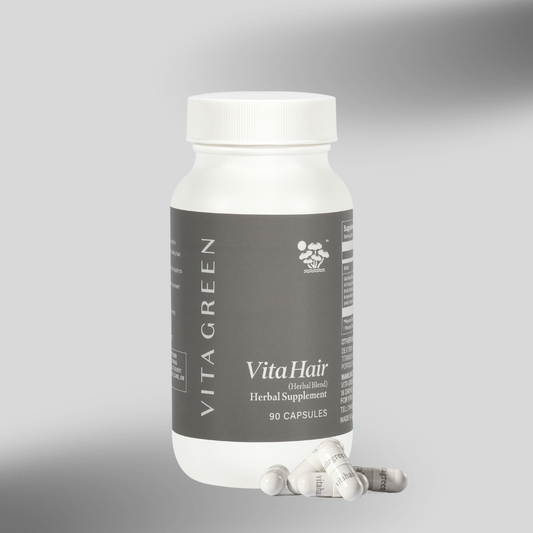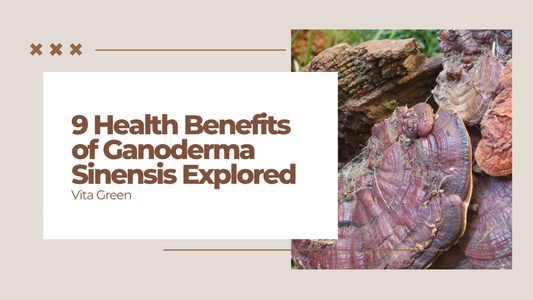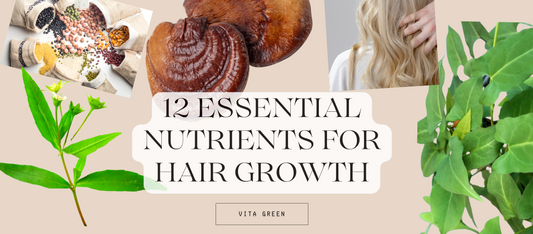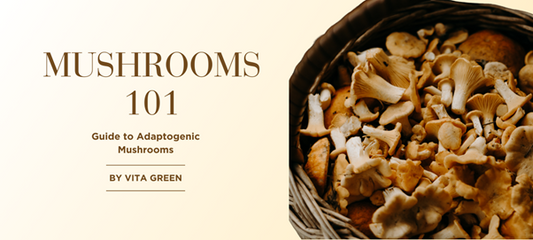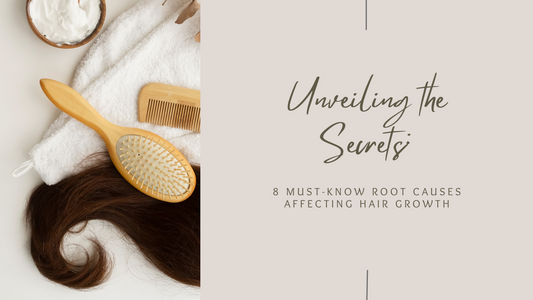By Frances Fajardo
When it comes to achieving the hair of your dreams, it's not just about what you put on your strands—it's also about what you put into your body. The secret to luscious, healthy hair lies in nourishing it from within with the right blend of essential nutrients. These nutrients serve as the building blocks for strong, vibrant hair growth, ensuring that your locks shine with vitality and bounce. Let's explore the twelve key nutrients that play a crucial role in promoting hair growth and maintaining overall hair health.
1. Protein
Protein serves as the cornerstone of healthy hair growth, playing a pivotal role in maintaining the strength, resilience, and structure of hair strands. Specifically, hair is primarily composed of a fibrous structural protein called keratin, which forms the foundation of hair strands. Without an ample supply of protein, hair may become weak, brittle, and prone to breakage, hindering its growth potential.

Incorporating protein-rich foods into your diet is essential to ensure that your hair receives the necessary building blocks for robust growth and optimal health. Here's why some of these protein sources are particularly beneficial:
Eggs are a convenient and versatile source of protein, containing not only essential amino acids but also biotin, another vital nutrient for hair health. Biotin helps strengthen hair and promote its growth, making eggs a double boost for your locks.
Lean meats such as chicken and turkey provide high-quality protein without excessive saturated fats. Additionally, they contain iron, which supports oxygen transport to the hair follicles, facilitating healthy growth.

Fatty fish like salmon, mackerel, and trout are rich in protein and omega-3 fatty acids. These healthy fats nourish the scalp, reduce inflammation, and promote hair growth from within, contributing to stronger and healthier hair.
Legumes, including beans, lentils, and chickpeas, offer plant-based sources of protein ideal for vegetarians and vegans. Apart from protein, they also provide essential nutrients like iron and zinc, crucial for maintaining healthy hair.

Ensuring a diverse array of protein sources in your diet provides your hair with various amino acids, essential for synthesizing keratin and repairing damaged hair strands. Incorporating protein-rich foods into your meals helps maintain the strength, elasticity, and overall health of your hair, allowing it to thrive in terms of length and thickness.

Prioritizing protein as a staple in your diet, you can promote vibrant, luscious locks that exude strength and vitality, ensuring your hair reaches its full potential in terms of health and appearance. Your hair will thank you for the nourishment it receives, showcasing newfound resilience and beauty.
2. Biotin
Biotin, also known as vitamin B7 or vitamin H, stands out as a vital nutrient crucial for maintaining healthy hair growth and ensuring its strength. This water-soluble B-vitamin plays a multifaceted role in the body, but its impact on hair health is particularly noteworthy.

Firstly, biotin aids in the metabolism of amino acids, the building blocks of proteins like keratin, which is the predominant structural component of hair. By facilitating this process, biotin contributes directly to the growth and maintenance of strong, resilient hair strands. In essence, it acts as a catalyst in the production of keratin, ensuring that your hair has the necessary foundation for growth and strength.
Moreover, biotin deficiency has been linked to hair loss and brittle hair. Insufficient levels of biotin can disrupt the hair growth cycle, leading to thinning hair and increased shedding. Therefore, ensuring an adequate intake of biotin is essential for maintaining the overall health and vitality of your hair.

Fortunately, incorporating biotin-rich foods into your diet is relatively simple and can have a significant impact on your hair health. Foods such as nuts, seeds, eggs, and sweet potatoes are excellent sources of biotin. Nuts like almonds and walnuts, as well as seeds such as sunflower seeds and flaxseeds, provide not only biotin but also essential fatty acids and antioxidants that support hair health. Eggs, in addition to being rich in biotin, offer high-quality protein necessary for hair growth and strength. Sweet potatoes, with their abundance of beta-carotene, which converts to vitamin A in the body, complement biotin by promoting a healthy scalp environment conducive to hair growth.

By incorporating these biotin-rich foods into your diet regularly, you can help ensure that your body has an ample supply of this crucial nutrient to support healthy hair growth and maintain its strength and vitality. Whether as a snack, a meal component, or a side dish, these foods can serve as delicious and nutritious additions to your diet, contributing to your overall well-being and the health of your hair.
3. Vitamin A
Vitamin A, renowned for its role in promoting overall health, also plays a pivotal role in maintaining the health of your hair and scalp. One of its primary functions in this regard is its involvement in the production of sebum, the natural oil secreted by the sebaceous glands in the scalp. Sebum acts as a protective coating for the hair follicles, keeping them moisturized and safeguarded against environmental damage.

When the scalp lacks sufficient sebum production, it can lead to dryness, flakiness, and irritation, which may manifest as dandruff or scalp inflammation. Additionally, dry scalp conditions can compromise hair health, making it more susceptible to breakage and dullness.
By ensuring an adequate intake of vitamin A, you can support the optimal functioning of the sebaceous glands, thereby promoting the production of sebum to keep your scalp moisturized and your hair hydrated. This not only fosters a healthy scalp environment but also contributes to the overall strength and luster of your hair.

Incorporating vitamin A-rich foods into your diet is a simple yet effective way to support your hair health from within. Carrots, known for their vibrant orange hue, are particularly abundant in beta-carotene, a precursor to vitamin A. Consuming carrots can help boost your vitamin A levels and promote sebum production, thereby nourishing your scalp and hair follicles.

Similarly, leafy greens like spinach and kale are excellent sources of vitamin A, providing a wealth of nutrients that support overall health and well-being. These nutrient-dense greens not only contribute to your daily vitamin A intake but also offer an array of antioxidants and vitamins that promote hair growth and vitality.
Sweet potatoes, with their rich orange flesh, are another noteworthy source of vitamin A. They contain high levels of beta-carotene, which the body converts into vitamin A as needed. Incorporating sweet potatoes into your diet can help ensure that you're getting enough vitamin A to support optimal scalp health and hair growth.
4. Herba Ecliptae
Herba Ecliptae, also known as Bhringraj in traditional Ayurvedic medicine, holds a special place for its reputed ability to nurture hair health and stimulate growth. Laden with a diverse array of bioactive compounds, this herb is celebrated for its potential to revitalize the scalp and fortify hair follicles.

Herba Ecliptae boasts a wealth of antioxidants, including flavonoids and polyphenols, which serve as guardians against oxidative stress. This stress, if left unchecked, can compromise the function of hair follicles and contribute to hair loss. By neutralizing free radicals, Herba Ecliptae contributes to a fortified scalp environment, bolstering the foundation for healthy hair growth.
One notable benefit of Herba Ecliptae is its potential to improve blood circulation to the scalp. Enhanced blood flow ensures that hair follicles receive an ample supply of oxygen and nutrients, essential for promoting healthy growth and minimizing hair loss. By optimizing scalp circulation, Herba Ecliptae facilitates the delivery of vital nutrients to the hair follicles, supporting their strength and vitality.

Herba Ecliptae is also believed to possess nourishing properties that directly benefit the hair follicles. It helps to replenish moisture and nutrients, thereby strengthening the hair shaft and reducing breakage. By providing essential nourishment to the hair follicles, Herba Ecliptae supports the development of thicker, stronger strands, resulting in visibly healthier hair over time.
Moreover, Herba Ecliptae is believed to possess cooling and soothing properties, offering relief from scalp irritation and inflammation. A tranquil and balanced scalp forms the cornerstone of sustained hair health, preventing disruptions to the hair growth cycle.
5. Vitamin E
Vitamin E, often dubbed the "skin vitamin," is an essential nutrient that contributes significantly to maintaining not only skin health but also the vitality of your hair. Acting as a potent antioxidant, vitamin E acts as a protective shield for hair follicles, safeguarding them against oxidative stress induced by free radicals. This protection helps prevent damage to the scalp and hair follicles, creating an environment conducive to healthy hair growth.

Moreover, vitamin E possesses anti-inflammatory properties, which can soothe and calm the scalp, reducing the risk of irritation and inflammation that may hinder hair growth. Additionally, by supporting blood circulation to the scalp, vitamin E ensures that essential nutrients reach the hair follicles, promoting optimal hair growth and overall hair health.
Incorporating vitamin E-rich foods into your diet is an effective way to ensure your body receives an ample supply of this vital nutrient to support healthy hair growth. Almonds, one of the richest sources of vitamin E, provide a substantial dose of this nutrient in a small serving. Spinach, avocado, and sunflower seeds are also excellent sources of vitamin E, offering diverse options to incorporate into your meals and snacks.

Regularly incorporating these vitamin E-rich foods into your diet provides your body with the essential nutrients necessary to support healthy hair growth and maintain scalp health. Additionally, consider integrating hair care products containing vitamin E or applying vitamin E oil directly to your scalp and hair for added nourishment and protection. With the right combination of nutrients and care, you can help your hair thrive, exuding vitality and strength.
6. Iron
Iron, a vital mineral essential for numerous bodily functions, plays a crucial role in maintaining healthy hair growth by facilitating the production of hemoglobin, a protein present in red blood cells responsible for transporting oxygen throughout the body. While iron's significance for overall health is widely acknowledged, its contribution to hair health is often underestimated.

Insufficient iron levels in the body can lead to iron deficiency or anemia, characterized by symptoms such as fatigue, weakness, and hair loss. Hair follicles rely on a steady oxygen supply and essential nutrients to support growth and maintenance. When iron levels are inadequate, oxygen delivery to the scalp and hair follicles is compromised, disrupting the hair growth cycle and resulting in hair thinning and shedding.
To promote healthy hair growth and prevent iron deficiency-related hair loss, it's essential to incorporate iron-rich foods into your diet. These include red meat, such as beef, lamb, and pork, which provide highly bioavailable iron that the body can absorb efficiently.

Lentils, a nutritious legume, offer a plant-based source of iron suitable for vegetarians and vegans, along with protein, fiber, and other essential nutrients. Leafy greens like spinach are rich in iron and also contain vitamin C, which enhances iron absorption, supporting optimal iron levels for healthy hair growth. Additionally, fortified cereals, a convenient breakfast option, can help increase iron intake, particularly during the morning meal.

Consuming iron-rich foods alongside sources of vitamin C can further enhance iron absorption, maximizing its benefits for your hair and overall well-being. Prioritizing a balanced diet rich in iron ensures that you nourish your hair from within, maintaining its strength and vitality.
7. Zinc
Zinc, often hailed as the "gatekeeper of hair follicle health," is a trace mineral crucial for various physiological processes, including hair tissue growth and repair. Despite its small presence in the body, zinc exerts a significant impact on hair health. Deficiency in zinc has been associated with a range of hair issues, such as hair loss, thinning, and slow hair growth.

One of zinc's primary functions concerning hair is its involvement in cell division and tissue growth, crucial processes for maintaining healthy hair follicles. Zinc aids in the production of new hair cells and supports the repair of damaged tissues within the scalp and hair follicles. Additionally, zinc contributes to the synthesis of proteins, including keratin, the principal structural component of hair.
Incorporating zinc-rich foods into your diet is essential to ensure an adequate supply of this vital mineral for supporting healthy hair growth. Oysters stand out as one of the most concentrated food sources of zinc, providing a substantial dose in a small serving. Similarly, red meat like beef offers another excellent source of zinc, alongside high-quality protein and iron, essential for maintaining strong and healthy hair.

Pumpkin seeds serve as a rich source of zinc, offering a convenient and nutritious snack option rich in protein, fiber, and healthy fats. Lentils, as a plant-based source of zinc, provide not only zinc but also a plethora of other nutrients, including protein, fiber, and iron, making them an ideal choice, especially for those following vegetarian or vegan diets.

Whether integrated into meals or enjoyed as snacks, these foods provide delicious and nutritious options to support hair health from within. Prioritizing zinc-rich foods in your diet can nourish hair follicles and promote vibrant, resilient strands, ensuring optimal hair health.
8. Reishi Mushroom
Reishi mushrooms are celebrated for their numerous health advantages, including their potential to foster lush, vibrant hair growth. These mushrooms possess a rich array of bioactive compounds that contribute to scalp health and support the function of hair follicles.

One notable attribute of reishi mushrooms is their powerful anti-inflammatory properties. Chronic scalp inflammation can disrupt the hair growth cycle and lead to conditions like dandruff and hair loss. By mitigating inflammation, reishi mushrooms create a more favorable environment for robust hair growth.
Reishi mushrooms are also rich in polysaccharides and antioxidants, which help protect hair follicles from oxidative stress and damage caused by free radicals. This protective effect helps maintain the health of the hair follicles, ensuring they can produce strong, resilient hair strands.

Additionally, reishi mushrooms have been associated with enhanced circulation, which is crucial for delivering essential nutrients and oxygen to the hair follicles. Improved blood flow to the scalp nourishes the hair roots, promoting optimal conditions for hair growth and minimizing the risk of hair loss.
Reishi mushrooms offer a range of benefits for supporting optimal scalp health and promoting vibrant hair growth, making them a promising natural remedy in the quest for beautiful, resilient hair.
9. Vitamin D
Vitamin D, often referred to as the "sunshine vitamin," is a fat-soluble nutrient crucial for various physiological functions in the body. While its primary role is maintaining bone health by regulating calcium and phosphorus absorption, emerging research suggests that vitamin D may also influence hair growth and follicle cycling.
Hair follicles undergo a continuous cycle of growth, rest, and shedding, known as the hair growth cycle. Recent studies have identified the presence of vitamin D receptors in hair follicles, indicating a potential role for vitamin D in regulating this cycle. Furthermore, vitamin D deficiency has been associated with disruptions in the hair growth cycle, leading to hair thinning and loss.

Incorporating vitamin D-rich foods into your diet is essential for maintaining optimal levels of this vital nutrient to support healthy hair growth. Fatty fish, such as salmon, mackerel, and tuna, are excellent dietary sources of vitamin D. These fish not only provide vitamin D but also offer essential omega-3 fatty acids, which further support scalp health and hair growth.
Fortified dairy products, including milk, yogurt, and cheese, are also significant sources of vitamin D. Consuming these fortified dairy products can help boost your vitamin D intake and support overall hair health. Additionally, mushrooms, particularly varieties like shiitake and portobello, contain vitamin D, making them a valuable plant-based source of this nutrient.

In addition to dietary sources, spending time in the sun is an effective way to increase your vitamin D levels naturally. Sunlight triggers the synthesis of vitamin D in the skin, allowing your body to produce this essential nutrient. Aim for moderate sun exposure each day, taking precautions to protect your skin from sunburn and damage.
By incorporating vitamin D-rich foods into your diet and spending time in the sun, you can ensure that your body has an adequate supply of this vital nutrient to support healthy hair growth and follicle cycling. Prioritize these sources of vitamin D to nourish your hair follicles and promote vibrant, resilient strands from the inside out.
10. Fo-Ti
Fo-ti, also known as Polygonum multiflorum or He Shou Wu, is a traditional Chinese herb celebrated for its potential to support hair health and growth. This herb offers a rich array of bioactive compounds that can nourish the scalp and promote the function of hair follicles.

Fo-ti is rich in antioxidants, including flavonoids and stilbenes, which help protect cells from oxidative stress. Oxidative damage can harm hair follicles and disrupt the hair growth cycle. By neutralizing free radicals, fo-ti supports a healthier scalp environment, conducive to robust hair growth.
Additionally, fo-ti is believed to possess adaptogenic properties, meaning it may help the body adapt to stress and promote overall resilience. Stress can negatively impact hair health and contribute to conditions like hair loss. By mitigating the effects of stress, fo-ti may help maintain the health and vitality of the hair follicles, supporting optimal hair growth.

Incorporating fo-ti into your wellness routine, whether through herbal supplements or topical applications, may offer benefits for those seeking to enhance hair growth and maintain healthy-looking hair.
11. Magnesium
Magnesium, a mineral often overlooked but crucial for overall health, plays a significant role in supporting hair growth and preventing hair loss. Its importance lies in its involvement in various biochemical processes essential for maintaining healthy hair follicles and promoting robust hair growth.

One key function of magnesium is its role in protein synthesis, particularly the production of keratin, the protein that forms the structural backbone of hair strands. Adequate levels of magnesium are necessary for the proper synthesis of keratin, ensuring the strength and integrity of hair fibers. Without sufficient magnesium, hair strands may become weak, brittle, and prone to breakage.
Additionally, magnesium helps regulate calcium levels within cells, which is essential for maintaining the proper functioning of hair follicles. Imbalances in calcium levels can disrupt the hair growth cycle, leading to issues such as hair thinning and loss. By ensuring optimal magnesium intake, you can help support the healthy functioning of hair follicles and promote a robust hair growth cycle.

Incorporating magnesium-rich foods into your diet is an effective way to ensure your body receives an ample supply of this essential mineral to support hair health. Some notable sources of magnesium include almonds, spinach, cashews, and whole grains.
Almonds are not only rich in magnesium but also provide other nutrients beneficial for hair health, such as vitamin E and protein. Similarly, spinach is packed with magnesium, along with other vitamins and minerals, making it an excellent addition to salads, smoothies, or cooked dishes. Cashews offer a satisfying crunch and are a good source of magnesium, while whole grains like oats, quinoa, and brown rice provide a steady supply of magnesium along with fiber and other essential nutrients.

Prioritizing these sources of magnesium can help promote vibrant, resilient hair that exudes vitality and strength. Magnesium, a mineral involved in numerous biochemical processes throughout the body, is increasingly recognized for its importance in maintaining healthy hair growth and preventing hair loss. While it may not receive as much attention as other nutrients, magnesium plays a pivotal role in various aspects of hair health.
12. Silica
Silica, though often overlooked, is a vital nutrient crucial for maintaining the elasticity and strength of hair. This mineral plays a pivotal role in various physiological processes within the body, including collagen formation and tissue repair. When it comes to hair health, silica's contribution is particularly noteworthy, as it directly impacts the structural integrity of hair strands.

One of the primary functions of silica in relation to hair is its role in promoting collagen production. Collagen is a protein that provides structural support to the skin, hair, and connective tissues throughout the body. Silica aids in the synthesis of collagen fibers, ensuring that hair follicles receive the necessary support for healthy growth and maintenance. Collagen helps maintain the elasticity of hair strands, preventing breakage and promoting overall strength.
Furthermore, silica helps regulate the balance of minerals within the hair shaft, including calcium and magnesium. This mineral balance is essential for maintaining hair health and preventing issues such as brittleness and dullness. By supporting mineral balance, silica contributes to the vitality and resilience of hair, helping to maintain its luster and shine.

Incorporating silica-rich foods into your diet is an effective way to ensure that your body receives an ample supply of this essential mineral to support healthy hair. Some notable sources of silica include bananas, oats, cucumbers, and strawberries.
Bananas are not only a delicious and convenient snack but also provide a good source of silica. Oats, commonly consumed as a breakfast staple, are rich in silica and offer a range of other nutrients beneficial for hair health. Similarly, cucumbers are hydrating and refreshing, and they provide silica along with other vitamins and minerals essential for overall well-being. Strawberries, known for their sweet flavor and vibrant color, are also a good source of silica, making them a delightful addition to any diet.

By ensuring your diet is rich in these twelve essential nutrients, you'll be providing your hair with the nourishment it needs to thrive. So, load up on nutrient-rich foods, and watch as your locks transform into the healthy, vibrant mane you've always wanted.
Is it Beneficial to Use Hair Growth Supplements?
The vitality of your hair is influenced by various factors, including your diet, lifestyle choices, and environmental conditions. When considering how to fulfill your nutritional requirements in a hair-friendly manner, experts often advocate for prioritizing whole foods over supplements. This preference stems from the fact that nutrients found in foods are typically more readily absorbed by the body compared to those found in supplement form.

Nevertheless, supplements can offer a concentrated source of specific nutrients that might be challenging to obtain in sufficient quantities from your diet alone, such as vitamin D and omega-3 fatty acids. These nutrients play crucial roles in supporting healthy hair growth and maintaining scalp health.
Before embarking on any supplement regimen, especially if you've experienced significant hair loss recently, it's prudent to consult with your healthcare provider. They can provide personalized advice tailored to your individual needs and circumstances, ensuring that any supplements you take are safe and appropriate for you.
While supplements can complement a balanced diet by providing additional nutrients, they should not be viewed as a substitute for a nutritious eating plan. Prioritizing diverse and wholesome diet rich in essential vitamins, minerals, and other nutrients remains the cornerstone of promoting optimal hair health and overall well-being.

If you're considering supplements, Vita Hair is an all-natural herbal hair growth supplement formulated with the principles of Traditional Chinese Medicine. Recommended and trusted by most doctors, Vita Hair is scientifically formulated with 13 different herbs frequently consumed for culinary and medicinal purposes, including the essential herbs mentioned above - reishi, fo-ti, and herba ecliptae. University studies have also shown that three capsules daily can improve hair growth by 60% within 90 days.
References:
- RD Agyeman, Valerie. “12 Best Foods for Hair Growth and Thickness, According to Dietitians”, Feb. 2024, https://www.goodhousekeeping.com/health/diet-nutrition/g26975180/food-for-hair-growth/
- Sowmya T. “Proteins For Hair: Important Food Sources, Supplements, DIY Masks & Salon Treatments”, Nov. 2021, https://skinkraft.com/blogs/articles/protein-for-hair
- “What is Keratin?”, Nov. 2021, https://keratincomplex.com/blogs/post/what-is-keratin#:~:text=Signature%20Keratin%20helps%20protect%20the,noticeably%20softer%20with%20incredible%20shine.
- MSN, CRNA Nall, Rachel. “What are the benefits of egg yolk for hair?”, Jul. 2023, https://www.medicalnewstoday.com/articles/321971
- MS RDD Van De Valle, Gavin and Catlett, Tess. “Biotin for Hair Growth: Does It Work?”, Mar. 2023, https://www.healthline.com/health/biotin-hair-growth
- “How does oxygen help with hair growth?”, Nov. 2018, https://orientalhairsolutions.com/blog/2018/07/11/how-does-oxygen-help-with-hair-growth/
- Lawler, Moira. “What Are Legumes? Types, Health Benefits, Nutrition Facts, Cooking Methods, and More”, Jun. 2023, https://www.everydayhealth.com/diet-nutrition/legumes-types-health-benefits-nutrition-facts-cooking-methods-and-more/
- “Vitamin H (Biotin)”, https://www.mountsinai.org/health-library/supplement/vitamin-h-biotin#:~:text=Hair%20and%20Nail%20Problems,in%20both%20children%20and%20adults.
- RDN, LD Ware, Megan. “Why do we need biotin (vitamin B7)?”, Feb. 2023, https://www.medicalnewstoday.com/articles/287720
- MD, FAAP Mundakel, Gratias Tom. “Biotin Deficiency”, Dec. 2023, https://emedicine.medscape.com/article/984803-overview?form=fpf
- “Benefits Of Beta Carotene For Skin, Hair & Overall Health”, https://www.cleanprogram.com/blogs/health-lifestyle/benefits-of-beta-carotene-for-skin-hair-overall-health
- Christiansen, Sherry. “Sebum Buildup on the Scalp: Causes and Treatment”, Jun. 2023, https://www.verywellhealth.com/sebum-buildup-on-scalp-5184298#:~:text=Sebum%20is%20a%20natural%2C%20waxy,make%20the%20hair%20look%20greasy.
- Schneider, Jamie. “4 Signs Of Scalp Inflammation & How To Remedy It”, Dec. 2019, https://www.mindbodygreen.com/articles/signs-of-scalp-inflammation
- “What Does Vitamin A Do for Hair?”, https://facemedstore.com/blogs/blog/what-does-vitamin-a-do-for-hair
- “THE BEAUTY OF VITAMIN C”, https://myhairdoctor.com/the-beauty-of-vitamin-c/#:~:text=Vitamin%20C%20is%20one%20of,as%20crucial%2C%E2%80%9D%20Guy%20says.
- Duggan, Caitlin. “Collagen Peptides for Hair: Benefits and How to Use”, Jan. 2023, https://www.byrdie.com/collagen-peptides-for-hair-5211316
- MD, MBA, FACP, ABOM Norfleet, Tracy. “Can Low Iron Levels Lead to Hair Loss?”, Aug. 2023, https://www.goodrx.com/conditions/hair-loss/can-iron-deficiency-cause-hair-loss
- Kelly, Erin. “20 Foods That Are High in Vitamin C”, Jan. 2024, https://www.healthline.com/nutrition/vitamin-c-foods
- Marcene, Brandi. “EAT THESE FOODS TO MAKE YOUR HAIR STRONGER AND LONGER”, Jan. 2018, https://kerotin.com/blogs/news/eat-these-foods-to-make-your-hair-stronger-and-longer#:~:text=Bell%20Peppers&text=Vitamin%20C%20is%20an%20extremely,for%20longer%20and%20stronger%20hair.
- Mary, Diane. “4 Ways Broccoli Will Help Your Curly Hair Journey”, May 2015, https://www.naturallycurly.com/curlreading/home/4-ways-broccoli-will-help-your-curly-hair-journey
- Fletcher, Jenna. “Is vitamin E good for your hair?”, Jul. 2023, https://www.medicalnewstoday.com/articles/322836
- Tamatam, Sowmya. “10 Ways To Increase Blood Circulation To Scalp For Great Hair”, Aug. 2022, https://skinkraft.com/blogs/articles/how-to-increase-blood-circulation-on-scalp
- Hamdani, Sanya. “6 ALMOND BENEFITS FOR HAIR YOU PROBABLY DIDN’T KNOW ABOUT”, Sep. 2023, https://www.bebeautiful.in/all-things-hair/everyday/almond-benefits-for-hair-you-did-not-know-about
- “5 foods to stop hair fall naturally”, Sep. 2022, https://economictimes.indiatimes.com/news/india/5-foods-to-stop-hair-fall-naturally/lentils/slideshow/94119385.cms
- MSN, CRNA Nall, Rachel. “Can an iron deficiency cause hair loss?”, Jan. 2024, https://www.medicalnewstoday.com/articles/321668
- Purdie, Jennifer. “Iron Deficiency and Hair Loss”, Sept. 2018, https://www.healthline.com/health/iron-deficiency-and-hair-loss
- “7 Foods To Eat To Encourage Healthy Hair Growth”, https://www.terramedical.sg/7-foods-to-eat-to-encourage-healthy-hair-growth/#:~:text=Red%20meat%2C%20like%20beef%2C%20lamb,hair%20follicle%20structure%20and%20function.
- O’Brien, Claire. “Cereals High In Iron & Iron Fortified Cereals – Active Iron”, https://www.activeiron.com/blog/cereals-high-in-iron/
- Zareie, Meena. “Zinc and Hair Loss: Understanding the Essential Mineral’s Role”, Feb. 2024, https://wimpoleclinic.com/blog/zinc-and-hair-loss-understanding-the-essential-minerals-role/#:~:text=Given%20that%20zinc%20aids%20in,foundation%20from%20which%20hair%20grows.
- “How does cell division play a role in hair growth?”, https://byjus.com/question-answer/how-does-cell-division-play-a-role-in-hair-growth/
- RD Kubala, Jillian. “12 Foods To Eat For Healthy Hair Growth”, Sept. 2023, https://www.health.com/foods-for-hair-growth-7963750#:~:text=Oysters%20are%20a%20rich%20source,telogen%20effluvium%20and%20brittle%20hair.
- “THE SUPERNATURAL POWERS OF PUMPKIN SEED EXTRACT: DISCOVER ITS HAIR GROWTH BENEFITS”, Oct. 2023, https://monpure.com/blogs/news/powers-of-pumpkin-seed-extract
- Doctor’s Desk. “Revitalise Your Tresses: Exploring the Influence of Omega-3 Fatty Acids on Hair Health”, Oct. 2023, https://www.clinikally.com/blogs/news/your-tresses-influence-of-omega-3-fatty-acids-on-hair-health
- “Alpha-Linolenic Acid (Ala) - Uses, Side Effects, and More”, https://www.webmd.com/vitamins/ai/ingredientmono-1035/alpha-linolenic-acid-ala
- Erdman J, Oria M, and Pillsbury L. “Nutrition and Traumatic Brain Injury: Improving Acute and Subacute Health Outcomes in Military Personnel.”, 2011, https://www.ncbi.nlm.nih.gov/books/NBK209320/
- “Docosahexaenoic Acid (Dha) - Uses, Side Effects, and More”, https://www.webmd.com/vitamins/ai/ingredientmono-864/docosahexaenoic-acid-dha
- RD Agyeman, Valerie and MS, RDN, CDN, NASM-CPT Sassos, Stefani. “12 Best Foods for Hair Growth and Thickness, According to Dietitians”, Feb. 2024, https://www.goodhousekeeping.com/health/diet-nutrition/g26975180/food-for-hair-growth/
- Deepsense, Rakesh. “The ‘Before’ and ‘After’ Chia Seeds For Your Skin and Hair”, Aug. 2022, https://www.jiwa.in/blogs/journal/chia-seeds-benefits-for-skin-and-hair#:~:text=Chia%20seeds%20are%20bursting%20with,hair%2C%20thus%20helping%20hair%20growth.
- “How Does Vitamin D Affect Hair?”, https://facemedstore.com/blogs/blog/how-does-vitamin-d-affect-hairnbsp#:~:text=So%20what's%20the%20link%20between,the%20hair%20strands%20will%20grow.
- Fletcher, Jenna. “Can a vitamin D deficiency cause hair loss?”, Jul. 2023, https://www.medicalnewstoday.com/articles/321673
- MS, RDN, LD Shoemaker, SaVanna. “What Is Fortified Milk? Benefits and Uses”, Sept. 2019, https://www.healthline.com/nutrition/fortified-milk
- “Top Benefits of Selenium for Hair Growth: Natural & Healthy Hair”, https://nyumi.com/blogs/news/top-benefits-of-selenium-for-hair-growth-natural-healthy-hair#:~:text=Selenium%20can%20help%20to%20prevent,keep%20hair%20healthy%20and%20strong.
- Ventura, Mara., Melo, Miguel., and Carrilho, Francisco. “Selenium and Thyroid Disease: From Pathophysiology to Treatment”, Jan 2017, https://www.ncbi.nlm.nih.gov/pmc/articles/PMC5307254/#:~:text=Since%20it%20is%20incorporated%20into,hormones%20%5B14%2C%2015%5D.
- Srivastava, Kadambari. “10 WAYS BRAZIL NUTS BENEFITS YOUR HEALTH, HAIR AND SKIN”, Nov. 2023, https://www.bebeautiful.in/all-things-lifestyle/health-and-wellness/brazil-nuts-benefits-for-your-health-hair-and-skin#:~:text=Regularly%20eating%20Brazil%20nuts%20make,gorgeous%2C%20healthy%20and%20thick%20mane.
- “Five Foods for Healthy Hair Growth”, https://www.belgraviacentre.com/blog/five-foods-for-healthy-hair-growth#:~:text=Tuna,pivotal%20to%20healthy%20hair%20growth.
- Garg, Prachi. Jan. 2024, “13 Health Benefits of Sunflower Seeds You Should Know!”, https://pharmeasy.in/blog/health-benefits-of-sunflower-seeds/#:~:text=Loaded%20with%20vitamin%20E%2C%20these,the%20risk%20of%20premature%20graying.
- Doctor’s Desk. “Magnesium for Hair Loss: How a Nutrient Can Help”, Mar. 2023, https://www.clinikally.com/blogs/news/magnesium-for-hair-loss
- W B Vernon. “The role of magnesium in nucleic-acid and protein metabolism”, 1988, https://pubmed.ncbi.nlm.nih.gov/2472534/#:~:text=Magnesium%20is%20an%20essential%20cofactor,RNA%20and%20translation%20into%20protein.
- A Zhang, T P Cheng, and B M Altura. “Magnesium regulates intracellular free ionized calcium concentration and cell geometry in vascular smooth muscle cells”, Feb. 1992, https://pubmed.ncbi.nlm.nih.gov/1543756/
- “An ultimate guide on benefits of cashews (kaju) for hair”, Sept. 2023, https://www.hkvitals.com/blog/an-ultimate-guide-on-benefits-of-cashews-kaju-for-hair/#:~:text=The%20healthy%20fats%20in%20cashews,hair%20texture%20and%20increased%20shine.
- Kester, Sarah. “Silica for Hair: Can It Fight Hair Loss?”, Jul. 2023, https://www.healthline.com/health/silica-for-hair#other-benefits
- Farooq, Muhammad Ansar and Dietz , Karl-Josef. “Silicon as Versatile Player in Plant and Human Biology: Overlooked and Poorly Understood”, Nov. 2015, https://www.ncbi.nlm.nih.gov/pmc/articles/PMC4641902/
- “Silica”, https://healthyhunnies.com/product/silica/#:~:text=Silica%20is%20needed%20to%20carry,other%20tissue%20in%20the%20body.
- Jamal, Raha. “The benefits of silica for hair health”, May 2023, https://www.sportskeeda.com/health-and-fitness/the-benefits-silica-hair-health
- Doctor’s Desk. “The Power of Banana Hair Masks for Lush Hair Growth”, Aug. 2023, https://www.clinikally.com/blogs/news/the-power-of-banana-hair-masks-for-lush-hair-growth
- Starkey, Lisa. “WHY OATS ARE AN EXTRAORDINARY GRAIN FOR YOUR SKIN, HAIR AND HEALTH”, Feb. 2023, https://nurturemybody.com/blogs/our-blog/why-oats-are-an-extraordinary-grain-for-your-skin-hair-and-health#:~:text=Oats%20contain%20plenty%20of%20omega,add%20thickness%20to%20each%20strand.&text=Oats%20also%20make%20hair%20more,pulling%20much%20better%20without%20breakage.
- “Cucumber benefits: how does it help your hair and scalp”, Nov. 2023, https://www.hkvitals.com/blog/cucumber-benefits-how-does-it-help-your-hair-and-scalp/#:~:text=Regularly%20rinsing%20your%20hair%20with,to%20maintain%20your%20hair's%20moisture.
- “Strawberry Hair Benefits”, https://seekbamboo.com/blogs/sustainable-lifestyle/strawberry-hair-benefits

